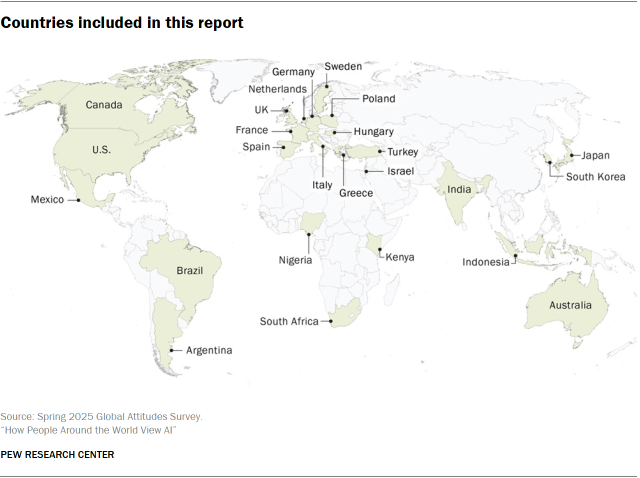
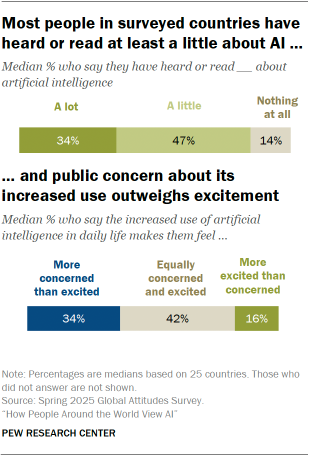
As the use of artificial intelligence (AI) increases rapidly, most people across 25 countries surveyed say they have heard or read at least a little about the technology.
And on balance, people are more concerned than excited about its growing presence in daily life.
A median of 34% of adults across these countries have heard or read a lot about AI, while 47% have heard a little and 14% say they’ve heard nothing at all, according to a spring 2025 Pew Research Center survey.
But many are worried about AI’s effects on daily life. A median of 34% of adults say they are more concerned than excited about the increased use of AI, while 42% are equally concerned and excited. A median of 16% are more excited than concerned.
What is a median?
In this analysis, median scores are used to help readers see overall patterns in the data. The median percentage is the middle number in a list of all percentages sorted from highest to lowest.
Concerns about AI are especially common in the United States, Italy, Australia, Brazil and Greece, where about half of adults say they are more concerned than excited. But as few as 16% in South Korea are mainly concerned about the prospect of AI in their lives.
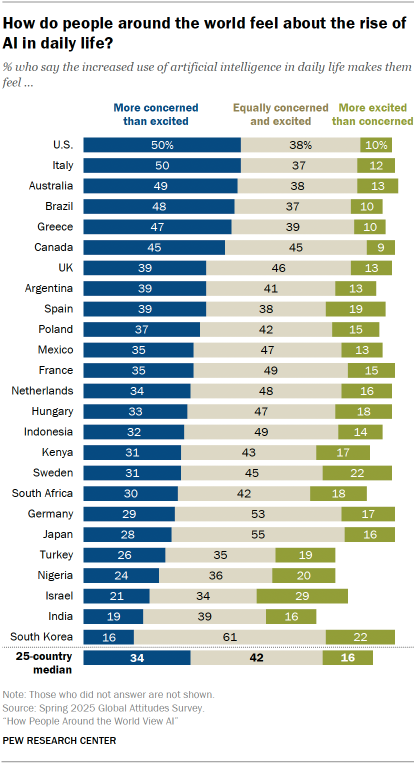
In fact, in many countries surveyed, a larger share of people are equally excited and concerned about the growing use of AI. In no country surveyed do more than three-in-ten adults say they are mainly excited.
The survey also finds a strong correlation between a country’s income – as measured by gross domestic product per capita – and awareness of AI. People in higher-income nations tend to have heard more about AI than those in less wealthy economies. For example, around half of adults in the comparatively wealthy countries of Japan, Germany, France and the U.S. have heard a lot about AI, but only 14% in India and 12% in Kenya say the same.
Trust in government to regulate AI
The survey also asked whether people trust their own country, the European Union, the U.S. and China to regulate the use of AI effectively.
Most people trust their own country to regulate AI. This includes 89% of adults in India, 74% in Indonesia and 72% in Israel. At the other end of the spectrum, only 22% of Greeks trust their country to regulate AI effectively.
Americans are almost evenly divided between trust in their country to regulate AI (44%) and distrust (47%).
Generally, people who are more enthusiastic about AI are more likely to trust their country to regulate the technology. And in many countries, views on this question are related to party affiliation or support for the governing coalition.
In the U.S., for example, a majority of Republicans and independents who lean toward the Republican Party (54%) trust the U.S. to regulate AI effectively, compared with a smaller share of Democrats and Democratic Party leaners (36%).
Related: How Americans View AI and Its Impact on People and Society
When it comes to other regulating entities, more people globally tend to trust the EU to regulate AI than trust the U.S. or China.
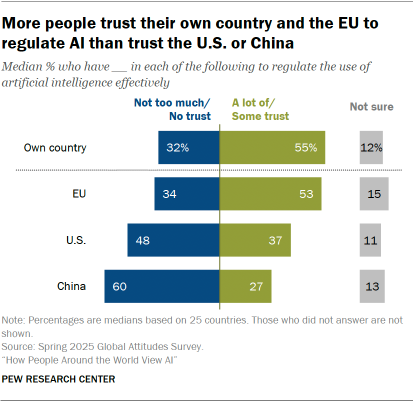
A median of 53% of adults in the surveyed countries trust the EU to regulate AI, while 37% trust the U.S. and 27% trust China.
Trust in the EU varies widely among the organization’s member nations: Adults in Germany and Netherlands are the most trusting, while their counterparts in France, Greece, Italy and Poland are the least trusting. Overall, a median of 54% across the nine member nations surveyed trust the EU to regulate AI, while 48% across the nonmember nations surveyed say the same.
Public trust in various actors to regulate AI is closely tied to how people view them overall. Generally, people with a more positive view of the EU, the U.S. and China are more likely to trust them to regulate AI effectively.
For instance, in countries like Indonesia and South Africa – where views of China are more positive than views of the U.S. – people are more likely to trust China to regulate AI than to trust the U.S.
There are other interesting demographic and political differences on these questions of trust:
- There is stronger trust in the U.S. as an AI regulator among people on the ideological right and among Europeans who support right-leaning populist parties.
- There is stronger trust in China as an AI regulator among younger adults in 19 countries surveyed.
- There is stronger trust in the EU as an AI regulator among people with more education in 19 countries. Additionally, Europeans who support right-wing populist parties are less likely than nonsupporters to trust the EU on this matter.
Demographic differences in awareness, perceptions of AI
Awareness and perceptions of AI differ along many demographic lines.
Age
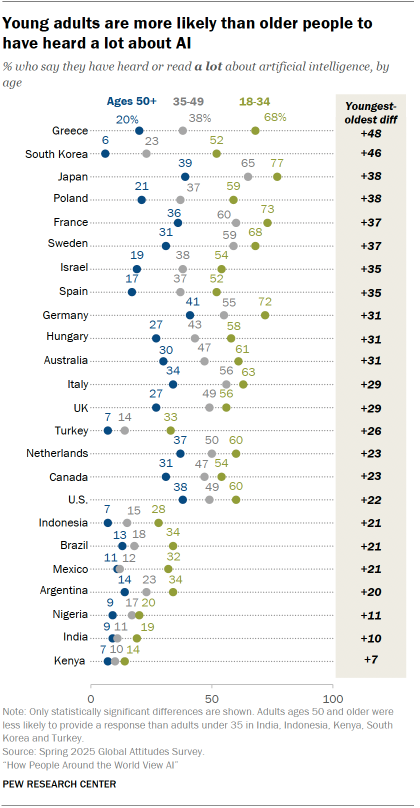
Young adults in virtually every country surveyed are more aware of AI than their older counterparts. For instance, 68% of Greek adults under 35 have heard or read a lot about the technology, compared with 20% among those ages 50 and older.
Young adults also tend to be more enthusiastic about AI. For example, 46% of Israeli adults under 35 are more excited than concerned about its increased use in daily life, compared with 15% of those ages 50 and older. Conversely, older adults are more concerned than excited relative to younger adults in 18 of the 25 countries surveyed.
Gender
In more than half of the countries polled, men are more likely than women to have heard a lot about AI. And in many countries, women are more likely than men to be mainly concerned about the increasing use of AI.
Education
Among people with less education, there is generally more concern than excitement about AI and less awareness of the technology overall, relative to people with more education.
Internet use
There is also a connection between internet use and views of AI. People who say they use the internet almost constantly are more likely than others to be mainly excited about the growing use of AI in everyday life. And in every country surveyed, these near-constant internet users are also more likely to have heard a lot about AI.
Related: Most adults across 24 countries are online at least several times a day
Jump to further analysis:
